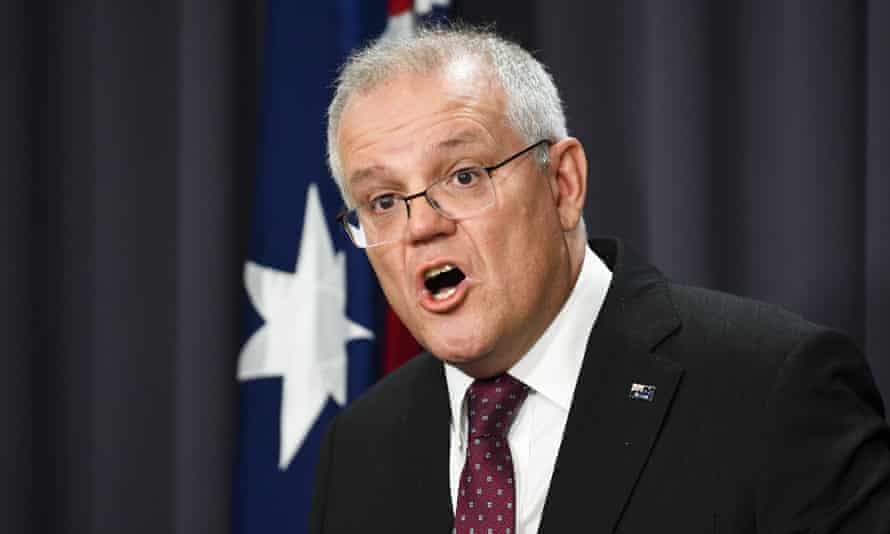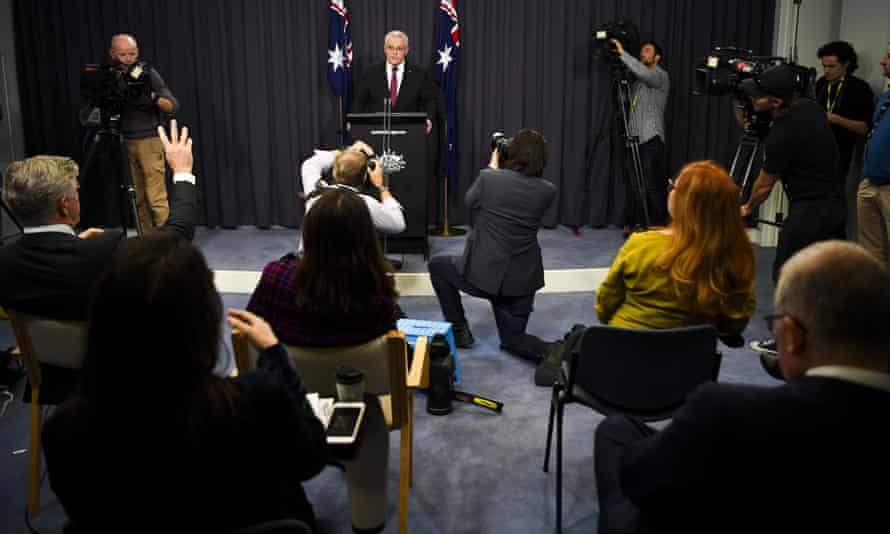Extract from The Guardian
Katharine Murphy on politics Scott Morrison

Last modified on Sat 3 Apr 2021 06.01 AEDT
We need to start with the latest numbers from our Guardian Essential poll.
If you missed the snapshot early this week, the short version is this: there’s a gender gap. On the face of it, the extraordinary #MeToo reckoning in the federal parliament that began with Brittany Higgins’ rape allegation is being processed differently by male and female voters.
Scott Morrison’s approval from women voters is down 16 points since Higgins went public with her story in February, and the prime minister supercharged the backlash by spinning rather than listening.
But it’s a different story with men. The prime minister’s standing with male voters is unchanged over the same period.
If we dive deeper into the data, the gender gap becomes even more pronounced. I didn’t realise this when I prepared the news story on Monday night, but approval for Morrison has actually increased among men aged between 18 and 34, from 56% to 67% during the relevant period. Approval for Morrison among men in non-capital areas has also increased (59% to 70%). Peter Lewis, the executive director of Essential, brought my attention to these trends late in the week after the data guys completed a few more cross tabulations.
Now before you pour yourself a breakfast martini to dull the sting of that bit of news, some quick caveats.
When we drill this far down into the data, we are dealing with small sample sizes, so perhaps this is just static. In more general terms, the positive and negative movements in Morrison’s approval rating certainly coincide with recent events, but that doesn’t mean recent events caused the shift.
Still, as I explained last weekend, Morrison is acting like a leader who believes he can plot a way through this crisis. The prime minister has very clear objectives every time he talks to voters, objectives that are generally well informed by research, and he doesn’t mind traversing a narrow pathway as long as there’s a victory at the end of it.
Objectively, these have been bad weeks for Morrison, and the botched rollout of the Covid-19 vaccine is creating yet more noise.
But even in the worst weeks of his prime ministership, Morrison is acting like a leader who thinks he’s got a lock on the male voters he needs to form government, and he’s begun a process of trying to persuade some of the women who evidently lost respect over the past few weeks back to his column – a campaign we will hear more of in the lead-up to the May budget.
Perhaps this extraordinary confidence, this sense of impregnability, explains how it came to pass that Morrison could, reportedly, stand up at a press conference ostensibly about apologising for being a dunderhead about the Higgins matter, while launching a coded attack on the journalist who broke the story, Samantha Maiden of news.com.au.
More of the broader controversy shortly but first, let’s deal with Patrick’s account of Morrison’s behaviour.
Many readers will remember that on that Tuesday, when Morrison was trying to tell Australian women he was listening and learning, there was a bizarre digression when the Sky News reporter Andrew Clennell posed a question the prime minister didn’t care for.
Morrison abruptly raised a complaint that he said had been made at News Corp about an episode of harassment in a women’s toilet. News Corp promptly whacked back, saying that hadn’t happened. Patrick reported that Morrison (who later apologised) believed at the time he was referring to an incident involving Maiden.
So just wrap your mind around that for a minute or two. We have a prime minister apparently apologising to Australian women and heralding a new chapter of enlightenment while (according to Patrick) dropping a coded “glass houses” warning to the journalist who broke the Higgins story.
As the meme goes, huge if true.

‘We have a prime minister apparently apologising to Australian women while dropping a coded warning to the journalist who broke the Brittany Higgins story.’ Photograph: Lukas Coch/AAP
That kind of behaviour, jangling spurs, fingers on triggers, would generally be considered more at home in a dusty saloon in a John Ford western than in the Blue Room of the Australian parliament. But perhaps I’m old-fashioned.
If that was the assumption, it proved to be incorrect.
Now to the broader controversy I referenced just before. As well as recounting the events of the last week, Patrick made a number of declarations in his piece. The reporter opined that the Higgins story, and the rape allegation against Christian Porter (denied by him), had “cleaved a schism through political journalism, exposing a shift in the centre of gravity from the male perspective to the female”.
Patrick also name-checked a number of reporters for producing “angry coverage that often strayed into unapologetic activism”. Apparently this (dare we impute hysterical) exhibition came from a “new female media leadership”.
I was one of the reporters name-checked in this particular category. So was Laura Tingle, who continues to write a column for Patrick’s masthead, the Australian Financial Review. Karen Middleton, who these days writes for the Saturday Paper, was also on the list.
Just for the record, Maiden, a Walkley award winning reporter who has led on the Higgins story, and is doing some the most important work of her career right at this moment, wasn’t tagged as an activist. She was “spiky” and “difficult”.
If you are reading Aaron, just a few thoughts.
Rape is a crime, and a heinous one.
Sexual harassment is completely unacceptable.
I don’t make these statements because I have a “female perspective”. I make them because they are factual.
Investigating allegations of rape and sexual harassment in a sustained way, requiring people to be accountable for how they manage their own workplaces, isn’t activism. It’s public interest journalism by any working definition, and if you or your editor have a different view to this, then we have a significant problem.
I began this weekend with our latest poll because it reinforces a very important point: the gender gap that is evidenced in the public responses to parliament’s #MeToo moment indicates we have a way to go in this country in establishing a common perspective around the seriousness of these particular issues.
Given the readership of the Financial Review will be highly attuned to this point, because, thus far, the corporate sector has moved faster than the parliament to grapple with toxic workplaces, why would a reporter and an editor promulgate sexist stereotypes? Was the provocation deliberate, striking a blow in the outrage economy, or was it just plain lazy?
While being categorised as “new female media leadership” (NFML) is probably the best appellation I’ve had since being categorised once by an employer as a “traffic acquisition cost” – it’s also not true.
Others can determine whether or not I exhibit leadership or not, but the fact is I have worked on this beat since 1996. I’ve covered eight prime ministers. I arrive early and I leave late.
Tingle and Middleton have been on this beat longer than me, moving seamlessly across platforms, reporting with great authority and insight. Forgive this uncharacteristic burst of humblebrag, but we’ve broken stories. We’ve managed bureaus. We’ve mentored younger journalists. We’ve written books and Quarterly Essays. We’ve won awards. Middleton and I have been awarded honorary doctorates. The other women name-checked in Patrick’s angry activist camp are also stellar, with journalistic pedigrees and contributions that speak for themselves.
The clear inference that we’ve just rolled into town to promulgate some NFML activism, that we are embarking on a hostile takeover of the (considered, authoritative, detached, non-activist) male perspective that is supposed to prevail in Canberra, is just mind-boggling to me, given we’ve been here the whole time.
It’s OK. Everyone can remain calm. We don’t need to storm the battlements and seize Paul Kelly’s column inches to pour out our womanly feelings, because we have columns of our own, where our analyses range freely from rape to the efficiency of the tax system.
If blokes like Aaron can’t see us, or imagine a world where professional perspectives are informed, sober and, mostly, shared (apart from periodic, unfortunate outbreaks of pale, male and stale); if the go to trope has to be Mars and Venus – sorry mate, but that’s not my problem.
No comments:
Post a Comment